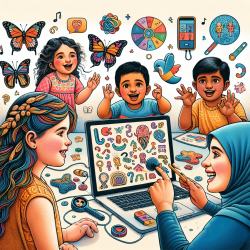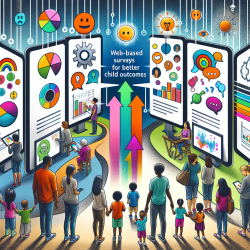Understanding the Impact of U.S. Immigration Medical Screenings on Refugee Children
The journey of a refugee is fraught with challenges, and for children, these challenges can be particularly daunting. As speech-language pathologists and educators, understanding the implications of U.S. immigration medical screenings is crucial for improving outcomes for refugee children. The research article "Refugee Policy Implications of U.S. Immigration Medical Screenings: A New Era of Inadmissibility on Health-Related Grounds" sheds light on the complexities of these screenings and their impact on refugee populations.
The Facts Behind Medical Screenings
The U.S. immigration medical screenings aim to identify health conditions that could render an applicant inadmissible. This includes communicable diseases, mental disorders with harmful behaviors, and substance abuse. However, these screenings can inadvertently affect refugee children, who may face barriers to entry due to health conditions endemic to their regions, such as tuberculosis or measles.
Implications for Practitioners
For practitioners working with refugee children, it's essential to understand these screenings' implications. Here are some key takeaways:
- Increased Disease Burden: Refugee children may have higher incidences of certain diseases, which can impact their ability to integrate into educational settings.
- Communication Barriers: Multilingual and multicultural differences can hinder effective communication, making it challenging to address health and educational needs.
- Stigma and Discrimination: Health-related inadmissibility can contribute to stigma, affecting children's mental health and willingness to seek help.
Data-Driven Solutions
Practitioners can enhance outcomes for refugee children by implementing data-driven solutions. Here are a few strategies:
- Conduct Comprehensive Assessments: Utilize data to assess children's health and educational needs accurately. This can help tailor interventions to individual requirements.
- Advocate for Policy Changes: Engage in advocacy efforts to address the limitations of current medical screenings and promote policies that consider the unique needs of refugee children.
- Foster Inclusive Environments: Create supportive educational settings that accommodate diverse cultural and linguistic backgrounds, ensuring all children have access to quality education.
Encouraging Further Research
The complexities of refugee health and U.S. immigration policies necessitate ongoing research. Practitioners are encouraged to stay informed about the latest findings and contribute to the body of knowledge through their work. By understanding the data and its implications, we can advocate for changes that improve the lives of refugee children.
To read the original research paper, please follow this link: Refugee Policy Implications of U.S. Immigration Medical Screenings: A New Era of Inadmissibility on Health-Related Grounds.










